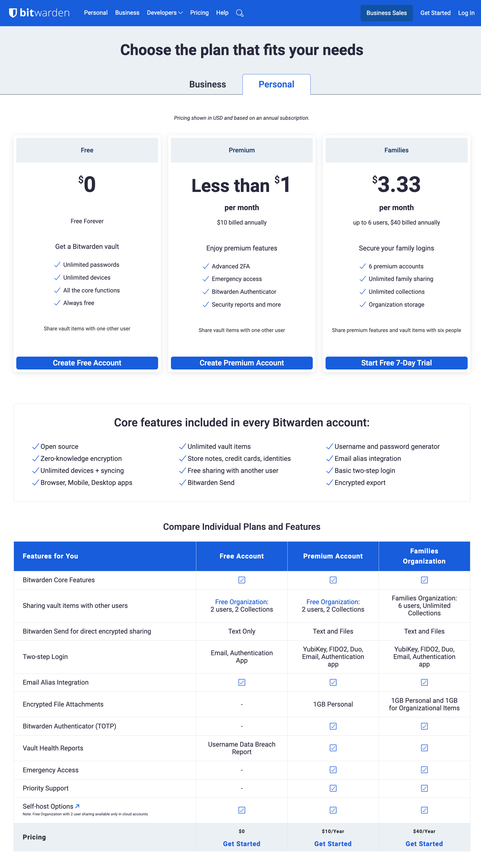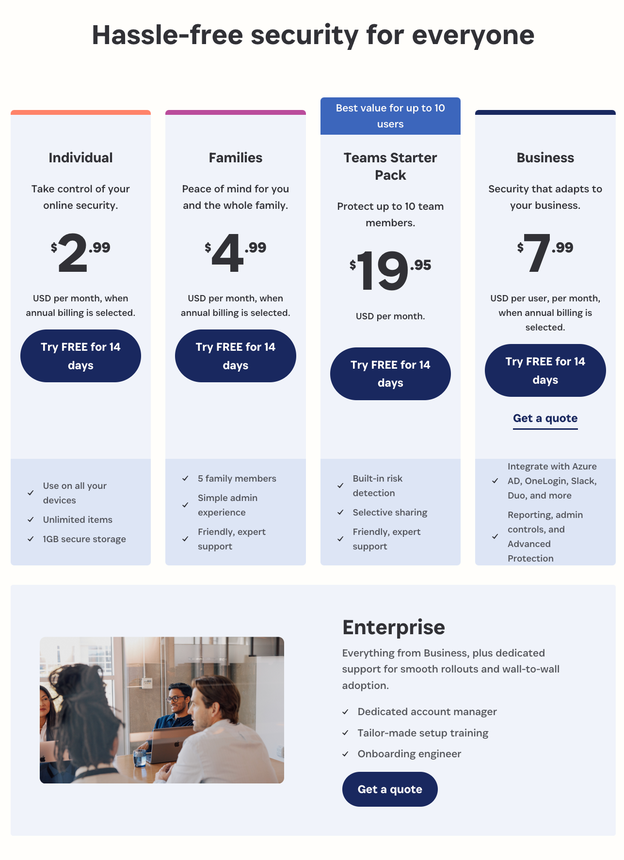In 2021, 1passwd/1password moved to a subscription only model and stopped allowing users to upgrade 1password 6 to 1password 7. For 1password 8, there is only an online database and subscription.
Many of us want to store our passwords locally only for banking and other high privacy matters. 1password was a good use scenario. There were always friendly Thanksgiving emails with very reasonable offers for perpetual license software. Soon the guys at AgileBits got greedy and started to update the core application as major revisions more and more often.
AgileBits must have been making a fortune on this model, as they sold a lot of $50 and even $65 licenses, including to me. Updates weren’t cheap either. But that wasn’t enough for AgileBits founder Dave Teare and Jeff Shiner. In 2019, AgileBits accepted $200 million in investment from VC firm Accel. Since then AgileBits has raised another $620 million. Investors and spokespeople include drug addicts/celebrities Ryan Reynolds, Robert Downey Jr., and Justin Timberlake. All of that capital will have to be paid back and with interest by 1password users.
The 1password VC express is a train end users should get off as soon as possible.
What’s particularly shocking is the origins of this capitalist ponzi scheme at a Christian conference:
we started close to eight years ago now. Roustem [Karimov] and I were both working full time at World Vision Canada, a very big multinational Christian organization. And we were just wanting to go out on our own. We actually just bought some Macs…Roustem [Karimov] kept on talking about a Mac, because he wanted a Mac for the longest time. And he just kept on telling me about why it was so cool…I sent him a Skype message saying “How does my Skype look coming from a Mac?” he couldn’t believe I had one. He was so jealous he had to run out and buy one. That’s kind of how we got started. So we started using them in our day jobs.
It’s astonishing how ten years and more money than they knew what to do with turned these friendly, overweight geeky Christians into greedy, VC backed predators. It’s an almost biblical tale, a great subject for a film.
In the meantime, what is an end user to do?
In 2020 and later, every security conscious user has two password related tasks.
- to keep extremely high value financial passwords off the internet and stored securely locally.
- to be manage logins to the dozens of websites every active citizen inevitably acquires in the course of life.
These two tasks require both a local application and one with passwords online.
The good news is 1password 6 still works on macOS 13 Ventura even on M1 Macs. You can continue to store your very confidential passwords locally in 1password 6 for now. I still use perpetual license 1Password 6 very actively with local sync (literally, with my flash drive, it’s automatic) for material I don’t want in the cloud (banking, credit card info, etc).
I don’t want my most important passwords online at all. AgileBits insists.
Move shared passwords to Bitwarden
1password has chosen to abuse its users. My point is that the standalone license (which 1password desperately try to hide and avoid selling) can actually be useful, for those of us who are legacy 1password users. The other point is that there are reasonably priced alternatives which work just as well or better than 1password. I have a team of twenty-five people on Bitwarden and we have literally zero issues with the product/service. All the browser extensions work well, the sync works perfectly.
Pricing Comparison
To collaborate and/or to populate across multiple devices (other Macs, iPads, iPhones, Android phones, tablets, Windows computers, even Linux), a couple can use Bitwarden and save $50/year doing so while continuing to use 1password desktop offline for high value passwords.
Bitwarden is $10/year for personal use, which includes two people (a couple). There’s a family plan at $40/year which includes six users. For professional use, there’s a $2/month per user version for teams (the website says $3/month but our bill says $2/month). There’s even an enterprise version at $5/month which allows on-premise hosting.
All of this is far more attractive than 1password’s extortionate $8/month per user for teams (four times more expensive) or $36/year for personal account (3.6 x more expensive than Bitwarden).
The only decent value in cloud version from 1password is the family account at $5/month (moving target unfortunately). Since my family in this case would be two people (the under contingent don’t have their own password vaults) the family plan is not particularly good value.
| Plan | 1password | Bitwarden |
|---|---|---|
| Individual | $36/year | $10/year |
| Couple | $60/year | $10/year |
| Family | $60//year | $40/year |
| Business | $8/month | $2/month |
Bitwarden also has a perfectly capable free version for individuals and couples (my personal Bitwarden account was free for years, while still part of a company account).
Patriot Act
The only caveat about Bitwarden (which applies to most of the password managers, we chose a replacement carefully) is that as it’s a US-based company it’s liable to the Patriot act and subsequent privacy-destroying legislation. 1password is Canadian-based so theoretically they are not liable to that legislation. On the other hand, with the existence of Five Eyes and the general aggressive stance of the US alphabet soup agencies regarding any tool which could provide a user any privacy, it’s unclear if 1password have been able to resist pressure to allow backdoor access from the authorities.
Famous Cup of Coffee Argument
But 1password only costs me the equivalent of an extra cup of [expensive] coffee every month! It’s a bargain AFAIC.
This is a very silly argument. If I paid a coffee every month for every piece of software I use, there would be no vacations and my family would be living mostly on pasta. We like to eat healthy food cooked from scratch with good ingredients. I don’t buy into subscription for everything and particularly, overpriced subscriptions. I’d rather give my money to the farmers. They work harder and care more about us, than would-be (and real) tech barons.
For teams, 1password is $7.99/month per user (if you want to have custom groups and per vault permissions, a necessity in a company) which works out to $160/month for a team of twenty. This is 4.57x more expensive than Bitwarden. A company using Bitwarden over 1password would save $1500/year. This is enough for two employees to attend an important marketing conference or to buy new equipment.
As an individual, twenty years of 1password would be $720 while Bitwarden for the same twenty years would be just $200 for what is effectively a better and leaner service.
I have no affiliation with Bitwarden at all, except as a satisfied customer or with AgileBits, except as a dissatisfied customer (the avaricious pricing model after fencing in enough Apple users like myself). AgileBits started like the name says, as an agile responsive scrappy company. Somewhere along the line they decided to jump in and hire huge marketing teams and go for enterprise pricing.
If you or your organisation don’t need endless handholding and non-stop marketing-feel good emails, there’s no technical reason to subsidise AgileBit’s recent inefficiency or gourmandise.
Instructive LastPass example: where greed leads
LastPass started as an efficient organisation as well until it was sold to a company who just buys applications with an established client base and quintuples prices while cutting back services in 2015. In turn LogMeIn, Inc. has been merged and sold (first to a Citrix company) and then to private equity companies Francisco Partners and Evergreen Coast Capital Corp, i.e. filials of vulture funds. Logmein quadrupled LastPass prices in 2016, losing many customers including us.
It was hard work finding a reliable, lightweight and secure solution to share passwords among a team. Sadly the excellent open-source tools like Keepass and its cousins do not work well for sharing password sets. Before we found Bitwarden, we tried Passwork.me which can be self-hosted, but it didn’t scale reliably to even the number of users and passwords we have to manage (company of twenty).
Personally I’m a fan of small software companies who control costs and pass the savings onto their users. I’m very tired of the cliché “hey, this piece of software just costs you a Starbuck latté per day/per week/per month”. I use hundreds of applications over the course of a year, about one quarter of which are FOSS or donation-ware (I often donate or fund), two thirds of which are shareware/small publishers. I’m very happy to enable smaller developers to make users lives’ better. I’m not happy to help greedy developers make shareholders richer.
Why pay more? 1passwords makes jobs
Adam Engst1 trotted out the old horseshoe that since 1password is a jobs creator, 1password users should pay more:
One thing to remember is that AgileBits is a pretty good-sized company at this point, with closing in on 200 employees.
That’s a bit my point. AgileBits has added a lot of staff. Why do they need more staff? To do more marketing. Why do they need to do raise prices? To afford a larger staff. It’s a bit a circle which results in higher and higher employee counts but higher and higher revenue requirements. In the end, the end user is not paying for better software but for a larger AgileBits empire.
It’s not the size of the team which determines the quality of the software (I’m sure you’re familiar with Frederick Brooks’ seminal work The Mythical Man Month 1). Michael Tsai manages C-Command Software more or less on his own. Perhaps Tsai has a small team of helpers (I hope so). SpamSieve alone may have done more to improve Apple users lives than 1password, certainly my own. Tsai manages to do well with great software, fair pricing and word-of-mouth.
Fair pricing and word-of-mouth was the original formula for AgileBits as well. AgileBits could probably be more profitable with lower prices, less staff and more enthusiastic word-of-mouth. Convincing people pay premium prices for ordinary software is a very expensive business.
-
This article should have been written four years ago. Indeed, an early version was posted on the TidBITs forum. ↩

Alec Kinnear
Alec has been helping businesses succeed online since 2000. Alec is an SEM expert with a background in advertising, as a former Head of Television for Grey Moscow and Senior Television Producer for Bates, Saatchi and Saatchi Russia.


Leave a Reply